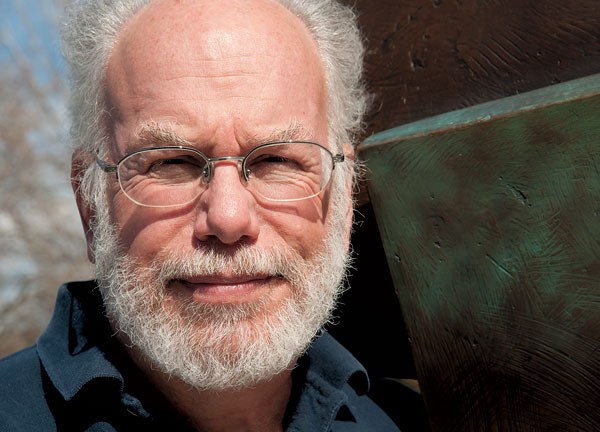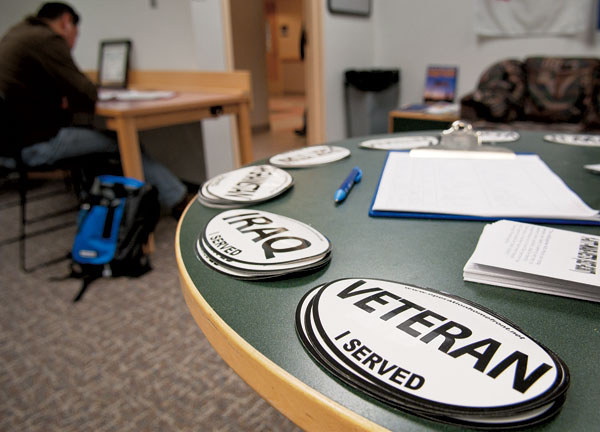The newest landmark on the WSU Tri-Cities campus is a sculpture of an open book with pages floating up from it to the sky. The bronze, titled Stories, is a statement for the military veterans who come to study at Tri-Cities.
What better way to show that there’s a place for them? And what better way to show the community that we’re here? asks Erick Flieger, the campus Vet Corps representative and one of around 130 military veterans attending WSU Tri-Cities last semester.
In the two years since campus leaders pledged to become a veteran-supportive campus, the school has increased its resources to accommodate veteran students and their families. At 8 percent of the student body, a disproportionately high number of students on campus are veterans.
Flieger transferred to WSU after two years of community college and 12 years in the military. School is a means of transitioning to civilian life. For him that meant moving his family to the community where he could pursue a degree in mechanical engineering. And for him and many others, it required redefining himself without the structure and stresses of his military past.
At minimum, you’re the odd one in a class full of 18- to 22-year-olds, says Flieger: “You feel like the old guy.”
Moreover, it can be confusing. These veteran students have come out of a strict and disciplined environment. They have been deployed abroad, lived in combat environments, and now they’re trying to concentrate in classes where the students around them don’t seem as focused: chatting, sending texts, checking their emails. Some veterans have significant hearing loss. In a room full of ambient noise, it becomes hard to concentrate, hard to hear the instructor, he says. And time management can be an issue. So can post-traumatic stress disorder and anxiety. “Simply put, stress for a veteran is different than stress for a regular student,” he says.
For many combat veterans “the adjustment to the collegiate setting has been a challenge,” says Janice Kusch ’05 PhD, who works for the U.S. Department of Veterans Affairs. Many on the Post-9/11 G.I. Bill have not been getting the grades they wanted nor completing their degrees. Some are repeating courses, for example, and they’re not graduating before their money runs out, she says. It’s a national problem.
Recognizing that, in 2011 the Department of Veterans Affairs started a program to provide these students with access to a clinical social worker or psychologist on campus. In 2012, WSU Tri-Cities joined 12 other schools in hosting the VITAL (Veterans Integration To Academic Leadership) program. “Student veterans already have an extraordinary amount of life experience,” says Kusch, who manages the VITAL program. But they struggle with adapting to new rules, relating to their classmates, and coping with challenges like disrupted sleep patterns, which can lead to a host of issues, including difficulty concentrating and anxiety.
Through VITAL, clinical psychologist Steve Malone runs a one-man outpatient clinic to help students who may be having issues like stress, difficulty adjusting, anxiety, and PTSD. Malone also works with the University’s Access Center to meet the specific needs of the veteran students who may have injuries or disabilities. He also helps them find resources in the greater community and liaises with the VA hospital in Walla Walla if the student requires medical treatment. VITAL also offers a professional counseling component. And one unexpected benefit, says Flieger, is that Malone can be an advocate for the veteran students with the University. He can recommend things like smaller classes and greater resources from the perspective of a mental health professional, adding weight to the veteran students’ requests.
The WSU Tri-Cities Veterans Center, near Malone’s office, offers tables for studying and a sofa to hangout, and a headquarters for Veterans & Allies, a student club for veterans and friends. Through efforts like pizza parties, community charity events, and workshops on things like how to transform your military résumé to a civilian skills-based résumé, the students can bond and build relationships with their community.
Through the Vet Corps program sponsored by the Washington State Department of Veterans Affairs, students can use the center to meet up with classmates having similar challenges. After living and working in a system with discipline, orders, and schedules, it is hard to be self-directed in a looser environment, says Flieger. Last fall he started a study-buddy program. “It’s like battle buddies,” he says, referring to the practice of assigning soldiers a partner in combat. “It’s connecting veterans with other veterans in the classroom.” The practice decreases stress, and provides the students a backup when it comes to notes, understanding the material, and preparing for exams. “We see benefits, with responsibility and accountability to buddies. They check up on each other,” he says.
Another layer of support brings in veteran tutors. Sometimes it can be discouraging to try to find help at the general tutoring center, says Flieger. This just makes it easier for them to get help with their classes from someone who knows what they’re going through.
As word gets out that the Tri-Cities campus is supportive of veterans, Flieger expects more will be drawn to study there. For him, the lure included cost of living, a larger community where his wife might find a job, and a small campus with small classes.
It’s a small enough community that everyone can feel a part of special projects, like the Stories sculpture, which was dedicated last October. The veteran students spent three years fundraising and collecting to build the monument and commissioned Tri-Cities artist Tom McClelland ’87 MFA to create it. The floating pages contain selected personal stories from the former soldiers, a tribute to all those touched by military service.
“The students built it to show they‘re not alone,” says Flieger, “that there’s a connection to campus and to other veterans.”



